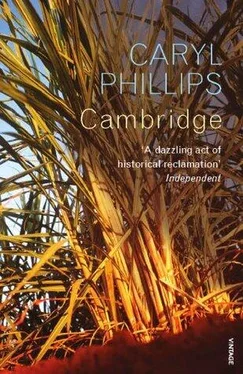Caryl Phillips - Cambridge
Здесь есть возможность читать онлайн «Caryl Phillips - Cambridge» весь текст электронной книги совершенно бесплатно (целиком полную версию без сокращений). В некоторых случаях можно слушать аудио, скачать через торрент в формате fb2 и присутствует краткое содержание. Год выпуска: 2009, Издательство: Vintage Digital, Жанр: Современная проза, на английском языке. Описание произведения, (предисловие) а так же отзывы посетителей доступны на портале библиотеки ЛибКат.
- Название:Cambridge
- Автор:
- Издательство:Vintage Digital
- Жанр:
- Год:2009
- ISBN:нет данных
- Рейтинг книги:5 / 5. Голосов: 1
-
Избранное:Добавить в избранное
- Отзывы:
-
Ваша оценка:
- 100
- 1
- 2
- 3
- 4
- 5
Cambridge: краткое содержание, описание и аннотация
Предлагаем к чтению аннотацию, описание, краткое содержание или предисловие (зависит от того, что написал сам автор книги «Cambridge»). Если вы не нашли необходимую информацию о книге — напишите в комментариях, мы постараемся отыскать её.
Cambridge — читать онлайн бесплатно полную книгу (весь текст) целиком
Ниже представлен текст книги, разбитый по страницам. Система сохранения места последней прочитанной страницы, позволяет с удобством читать онлайн бесплатно книгу «Cambridge», без необходимости каждый раз заново искать на чём Вы остановились. Поставьте закладку, и сможете в любой момент перейти на страницу, на которой закончили чтение.
Интервал:
Закладка:
How 'flat, stale and unprofitable' life can sometimes be! I speak now of Mr McDonald, who has just interrupted my afternoon rest to pay me an unsolicited visit. What is more, I fear his true purpose is out, for he asked me, in the manner of a hurt schoolboy, if it were true that I had dined with Mr Brown at a merchant's home. I answered in the affirmative, and added that I had enjoyed a pleasant evening, particularly the company of Arnold. Mr McDonald seemed somewhat taken aback by my confirmation of this and pleaded that he had any number of invitations to dine at all the influential houses on the island, and that he would be pleased if I might one day consider accompanying him. Without wishing to cause offence to Mr McDonald, I made it quite clear I already had a companion with whom I was more than satisfied. I indicated that it might make life difficult for all parties were I to be seen abroad with another man, and then I passed the situation back into his own no doubt capable hands and directly asked did he not think that this might be the case? Mr McDonald fell speechless. Jealousy is not an uncommon expression of the female temperament, but I believe its appearance in the male is altogether less openly displayed. Mr McDonald sat for some time staring at the space above my head, struggling with his emotions, not knowing my person well enough to declare, yet hoping that upon a hint I might speak. Upon the second, third, and perhaps even fourth hint, I had still not spoken. This was truly a painful encounter, and for the first time I realized what it can cost a man to declare his affection when he doubts a response. In a burst of generosity I attempted to free Mr McDonald from his dilemma by divulging I had information that a ship had been announced, and that I would probably leave for England soon after the Christmas festivities. This served its purposes, for Mr McDonald realized that he would now be excused on more equitable ground. He made a gesture or two in the direction of trying to persuade me to stay on for a few months longer, but then he took his departure. I watched as his carriage began to pick its way down the hill, and then I sighed as it disappeared into a parcel of breadfruit trees. Men, like polite women, should learn to restrain and control their emotions. I retired to my chamber and looked into my mirror. Perhaps the affections of all these men turn in due course to some brown-faced beauty.
This day has marked the beginning of the end of my sojourn in tropical America. Christmas is almost upon us and we should, black and white alike, be enjoying a period of rejoicing and spiritual renewal. Instead, I am daily subjected to tensions which test my fragile nerves, so much so that almost by the hour I feel myself sinking back into that weak state which so marred my arrival on this island. Mr Wilson has reappeared. I can find no other way to describe his appeal to my person, other than that he has thrown himself upon my mercy. I was relaxing after breakfast when Stella ushered onto the piazza a somewhat agitated black boy, who delivered a message in the incoherent slobber of negro speech that I should attend Mr Wilson in a Baytown boarding house. A hastily scribbled note, in what I assumed to be the hand of Mr Wilson, informed me that he had heard from a visitor to the neighbouring island, to which he had been exiled, that I had attended the merchant's dinner. According to his spy, I appeared to be a tolerant and well-mannered lady. I bade the excitable negro youth sit, and could not help but observe the affection that these poor blacks seemed to have for Mr Wilson. Stella beamed brightly, for truly a favourite had returned. After a moment's reflection I ordered my skittish sable duenna to have a carriage and pair prepared, for I determined that if I was going to rendezvous with this Mr Wilson I would do so before the sun was high.
En route, one slight unpleasant incident served further to try my fragile constitution. A few hundred yards beyond the village of Middle Way, I was accosted by a two-parts naked, one-part tattered little she-slave walking rapidly and energetically along the road. Upon her skull she sported a thick black that of frizzy wool, and through the thick encrustation of dirt I was able to discern the blackest, most leathery skin. Her sole request, with proffered claw, was the irresistibly ludicrous, 'Misses, misses, you please to buy me a comb for me to tick in me head.' The unfragrance of the negro came from earth, not heaven, and I was obliged to clap a lace handkerchief to my mouth and nose as we took our leave of this mahogany imp. A mile to the north-west of Baytown I espied some sassafras trees putting forth deliriously fragrant tassels of leaves and blossoms which enabled me to remove my handkerchief. These flowering shrubs, along with others new to my acquaintance, enchanted me with their strangeness, as did the wonderful butterflies which seemed to me almost as large as birds.
The rooming-house to which Mr Wilson's negro escorted me appeared to be in a most ruinous and battered condition. It was surrounded by a tiny strip of garden-ground that was barely rescued from the stretch of sandy deposit which bore the weighty name of street. From the vantage point of my carriage I might descry that the exterior paint of this dwelling had long since peeled away, that damaged boards needed repairing and in some parts replacing, and I imagined that there could not be a hinge upon any door that had not been long in the deepest need of oil. Instructing my negro driver not to stray, I followed Mr Wilson's black messenger into the dark interior and on into a small room where my father's former manager, a robustly built, though now ageing man, sat with his onerous new companion, poverty. The whole furniture of his room consisted of a chair, a wooden bench, a basin, a ewer, and a relic of soap of great antiquity. I saw a stained towel, and a glass for one's teeth, but little else. The open window of the room commanded an uninterrupted prospect of the kitchen, an open shed unfit for the stabling of a horse. There being evidently neither hostess nor chambermaid to serve me, Mr Wilson himself presented me with a glass of sangaree. Then, without more formalities, he rapidly engaged me in conversation, explaining that he had been banished by Mr Brown at gunpoint. Mr Brown, he declared, will brook no discussion on any topic; although Mr Brown is a good cane-man, fear, not debate, is his method of government. In short, he seemed keen to impress upon me that through a perverse stubbornness Mr Brown was mismanaging and abusing the property of my family, and that had Mr Wilson not been in fear of his life he would never have abandoned the estate. Mr Wilson's parting shots on the subject of Mr Brown were to assure me that, by nature, overseers are inclined to be irascible, but this man's nerves ceased to be under control once the sun was vertical!
Briefly our conversation floundered, then I explained to Mr Wilson that although I knew relatively little of island life I had been reliably informed that he had been dismissed for theft. At this Mr Wilson threw back his head and roared with laughter. Stealing! Did I not know that he was the most steadfast of Christians? In his whole life he had never stolen so much as a fruit from a bush. His only crime, he told me, was over-zealous civic pride, and a care for the welfare of the slaves. He had pursued the maximum profit compatible with humane decency. He was, he insisted, unwilling to see the negroes suffer the debilities brought on by cruel oppression for the sake of naked profit. His laughter took on something of the quality of bitter rage, so fiercely did he continue to mock the suggestion that he could be guilty of theft. By now I was so confused that my feverish head had begun to spin anew. I listened perplexedly as Mr Wilson lectured me on civic pride, claiming that despite the providence of God and nature, there was little that could be called beautiful in the West Indian townships, for nobody cared. The streets were poorly laid out, the public and private buildings mostly clumsy wooden structures, and only the churches and Government House had a scrap of style or dignity. True enough, inside of these ramshackle buildings things could be quite tidy, and even comfortable at times, but neither outward appearance nor civic amenity seemed to be given any consideration.
Читать дальшеИнтервал:
Закладка:
Похожие книги на «Cambridge»
Представляем Вашему вниманию похожие книги на «Cambridge» списком для выбора. Мы отобрали схожую по названию и смыслу литературу в надежде предоставить читателям больше вариантов отыскать новые, интересные, ещё непрочитанные произведения.
Обсуждение, отзывы о книге «Cambridge» и просто собственные мнения читателей. Оставьте ваши комментарии, напишите, что Вы думаете о произведении, его смысле или главных героях. Укажите что конкретно понравилось, а что нет, и почему Вы так считаете.












